WordPress or Joomla: Which CMS to Pick
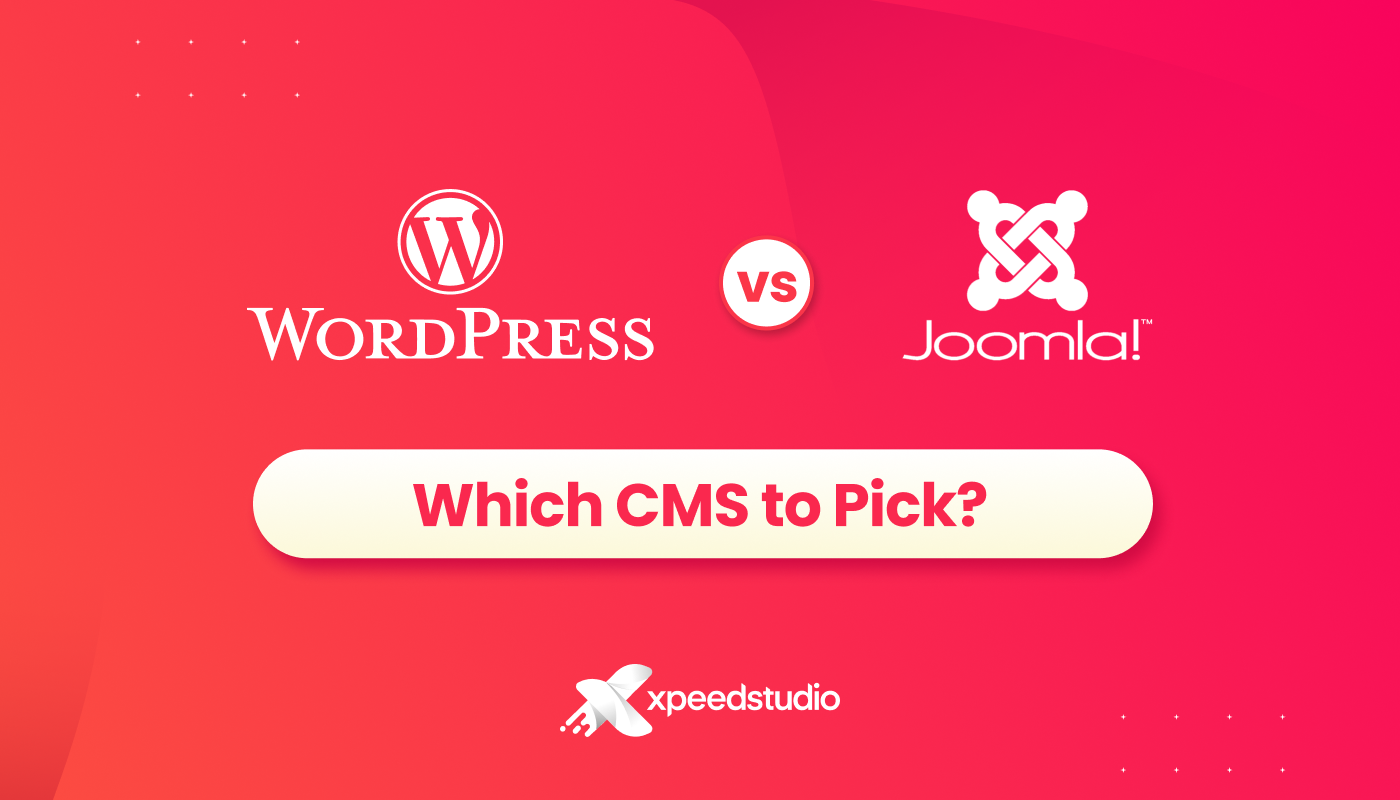
If you have ever thought of building a website or a blog, you must have heard about the term CMS. CMS is expanded as content management system and the good thing about it is that you can build your own business site or blogging site with a CMS. WordPress or Joomla, which one to pick?
However, scores of content management systems are available in the marketplace like WordPress, Joomla, Drupal, Squarespace, etc.
Among them, the two CMS platforms winning the race are WordPress and Joomla. But the question surely arising in your mind right now is which one out of the 2, you should pick to build your website. Both have their pros and cons, both of them are feature-rich, and are exceedingly popular among website users.
In this write-up, I will be comparing both WordPress and Joomla from different perspectives. I will walk you through the pros and cons of both the platforms collectively that will ease you to pick either WordPress or Joomla.
If you are curious to know about some of the top-notch WordPress accordion plugins, visit the link below-
Content Management System
Before you know which CMS is better, WordPress or Joomla, it’s salient that you are clear about the concept of CMS. So, what is a content management system? Content management system is tool or a piece of software letting you build a website even you have no knowledge on coding.
To put it simply, with CMS, you can create, edit, format, and publish any type of content on your website even without technical know-how. Basically, there are 3 core parts of a CMS- content, code, and layout.
- Content: In CMS, content files of texts, images, videos are stored individually than the website’s code and layout. You can add content to your website without affecting the code and layout of your website.
- Code: A CMS stores a site’s core code separately from the content. This lets you add security patches or other new functionalities without impacting the site’s content in one click.
- Layout: The platform also lets you pick different themes for your website and modify the site’s look when necessary. The benefit it provides is that you can tweak an existing theme without affecting the content and installed plugins of the site.
That, I hope is a pretty clear description on CMS. Now, before I go on to liken both WordPress and Joomla, let me present a few stats before you.
As per the data of W3Techs, WordPress holds a market share of 65.3% whereas Joomla has a market share of 2.6%.
Not only that, if you take a look at the analytics of BuiltWith, 30+ million live websites are running on WordPress currently whereas Joomla is running 1.5+ million live websites.
So, as per these pieces of stats, WordPress is miles ahead than Joomla when it comes to usability and market share. But I can’t conclude just from these pieces of stats that WordPress wins the rivalry. We will now take a deeper look at the other aspects of both the platforms. Eventually, you will decide if it’s WordPress or Joomla.
Let’s see now whether it’s WordPress or Joomla….
User-friendliness:
Ease of use matters a lot for website users as most of the users aren’t pro web developers, programmers, designers. All they want is to build a website smoothly and flawlessly in a short amount of time. They want an easy installation process, smooth navigation system, and no hassle of coding.
WordPress
WordPress, arguably tops the list when it comes to the ease of use. You can install this CMS platform in few minutes. On top of that, many hosting companies also offer a one-click WordPress installer in their hosting plans. Not only the installation process, even the admin panel of WordPress is designed with full of simplicity and clarity.
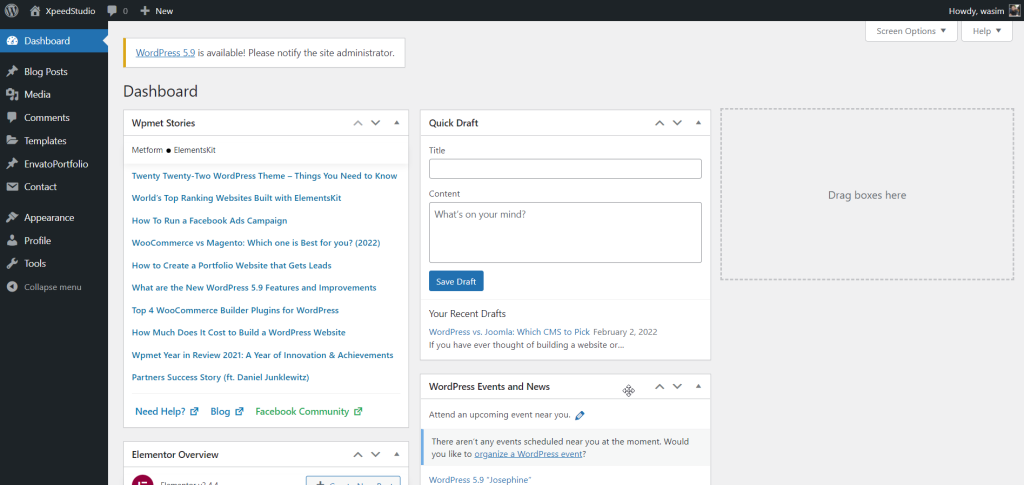
The backend area displays all the necessary details including the dashboard, content area, and installed plugins on the left-sided panel. Each and every section on the backend is so crystal clear that you will absolutely have no confusion with regard to navigating to the right area.
Whether it’s customizing a design, publishing a blog post, or editing any portion of your site, you can do that in your WordPress site straightaway with no hassle.
Joomla
When it comes to Joomla, the installation process is pretty similar as compared to WordPress even though it may not be as quick as the latter one. Other than that, like WordPress, there are hosting service providers that offer a one-click Joomla installer too.
However, Joomla’s control panel is a bit complex unlike WordPress. It contains many technical terms, bounty of admin pages, and different settings, making the navigation system tougher.
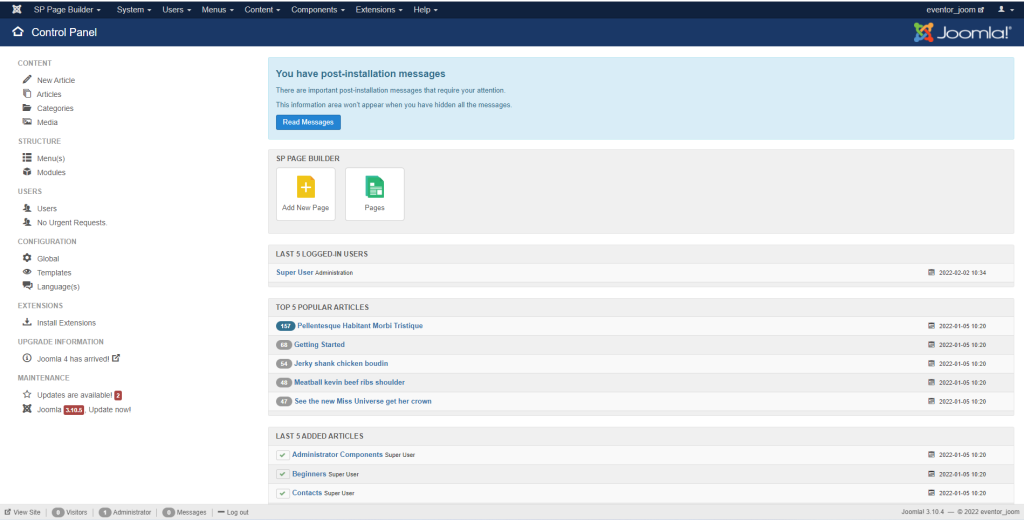
Unlike WordPress, Joomla uses a combo of Articles and Categories. That means, if you want to create a piece of content, you have to select the category first and then create the content.
This is an additional task and no doubt, complicated for the non-developers. However, if you take your time and learn the ropes around, you can learn all these complex steps.
Winner: WordPress
Content Management:
Content management system is a huge part of a website. And that’s why, it’s key that you pick a platform offering easy and feature-rich CMS. WordPress and Joomla both have CMS that you would fancy to use. But let’s take a look which one edges out the other one.
WordPress
WordPress has always been a strong CMS as initially it was a blogging platform. The platform makes it possible to create, manage, and publish abundance of multimedia content in a hassle-free manner. WordPress uses Gutenberg for content management.
But even before adopting Gutenberg as its default editor, it was a cakewalk to create pages and posts with Classic Editor. Apart from that, WordPress comes with static and dynamic page types. You can use the static page type to accommodate blog posts.
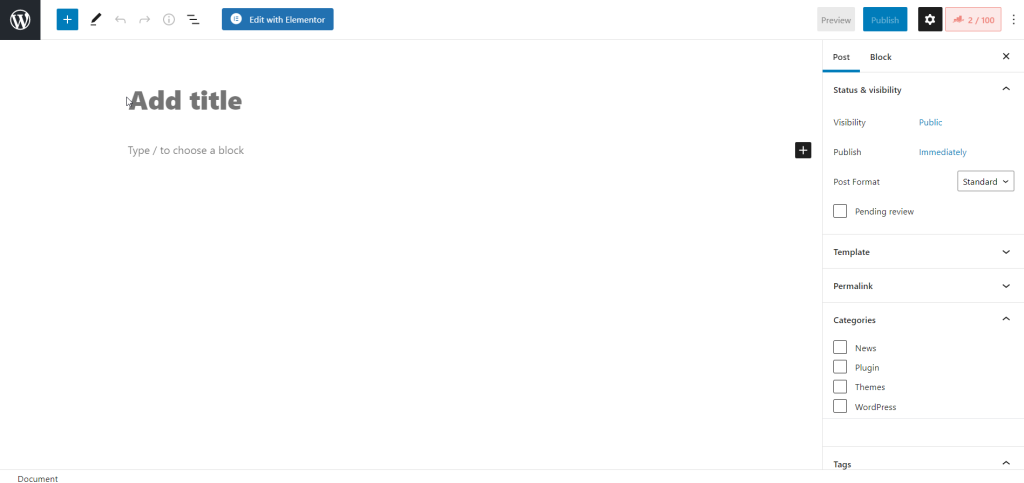
You also have the choice to decide on the page type while creating a post and deploy WordPress taxonomy to group similar posts and pages. You can also manage the access and restrictions to your site with WordPress’ predefined user roles.
Joomla
Joomla has a similar type of editor like Classic Editor called TinyMCE. You can also add editing extensions to make the template modifications simpler and easier. Like WordPress, Joomla doesn’t have a built-in taxonomy content system.
This allows you to install a taxonomy extension or build a one from scratch. The platform has 3 page types- single format, category blog, and custom module. As I mentioned earlier, you have to select a category in Joomla before you publish a post. But the good aspect of Joomla is it has a sturdy user management system.
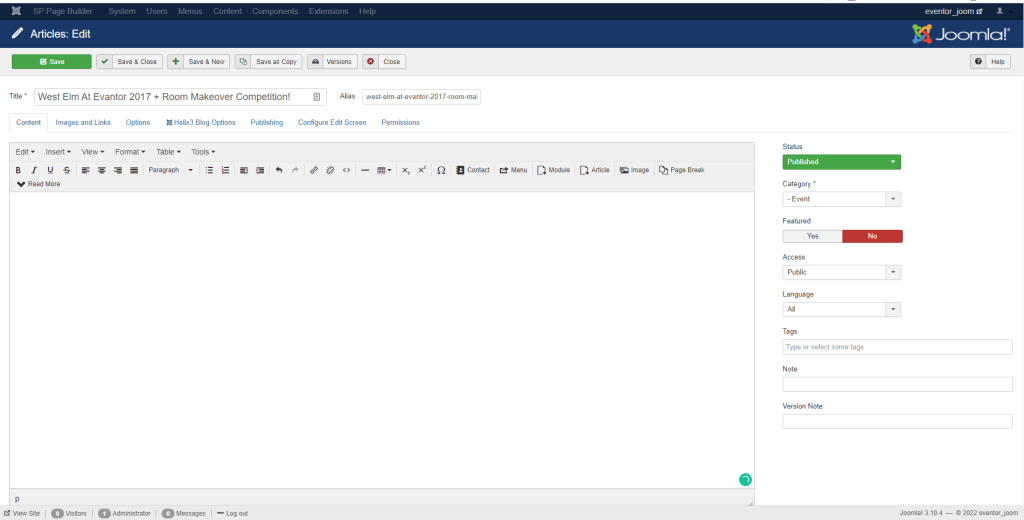
No matter whether it’s a user action or page restriction, Joomla comes with robust access control and user action log. With these systems, you can monitor the actions taken from a specific IP address and act accordingly.
Winner: WordPress
Security:
Security is always the utmost priority when it comes to picking a CMS for your website. Almost all the sites on the Internet are somehow or the other vulnerable to security threats. Both WordPress and Joomla have their own security measures which we will explore now.
WordPress
One fact about WordPress is it’s the most popular CMS nowadays. Hence, hackers target websites built with WordPress the most. But WordPress isn’t a fragile system rather it’s built with robust security code responding to security threats swiftly.
The CMS has auto-update system letting the websites update automatically when there is a new security patches. WordPress also comes with security enhancers like auto backup, two-factors notification, etc.

On top of that, the platform offers ample plugins and addons for the purpose of having advanced features on your site. However, all these plugins aren’t fully secure, so you have to be circumspect before using them. WordPress users, however, are now using paid SSL certificates to establish a secure connection with browsers.
Joomla
Joomla is also a popular CMS but to a lesser extent compared to WordPress. But it also has a larger user-base which convinces hackers easily to target even the Joomla-built sites. But like WordPress, Joomla also comes with strong security measures to prevent cyberattacks.
It readies its users with built-in security tools like 2-factors notification, Google Re-captcha, etc. to combat security attacks. Similar to WordPress, Joomla also offers a set of security plugins and extensions.
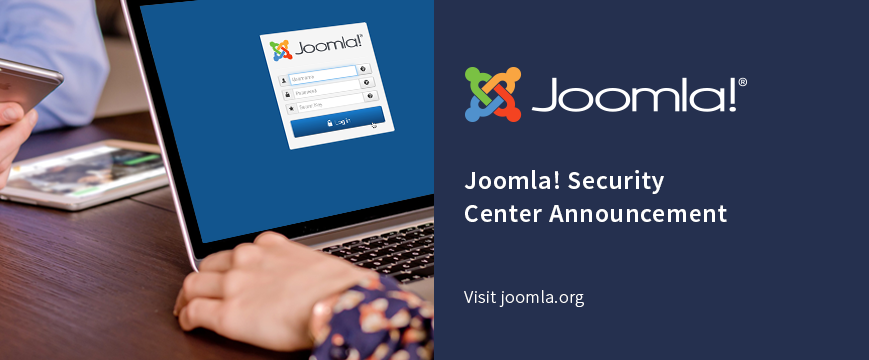
But Joomla unlike WordPress has its own “Joomla Force SSL” that lets users to activate SSL certificates in their core system without installing any additional plugin. However, installing updates for every new Joomla version is still in the hands of users as Joomla team will support the new version only for a short period of time.
Winner: Both WordPress and Joomla follow proper security standards
Help and Support:
Having a reliable support options is always of high priority prior to choosing a CMS platform. No doubt, both WordPress and Joomla have responsive support systems to resolve the issues of their users.
WordPress
WordPress is highly community-driven and has scads of active forums aiming to resolve issues of users. You can get solution to your problems from different docs, tutorials, webinars, handbooks, Facebook groups, etc. in addition to official support forums. Along with these guides, you can also hire WordPress Experts to get your complex issues fixed.
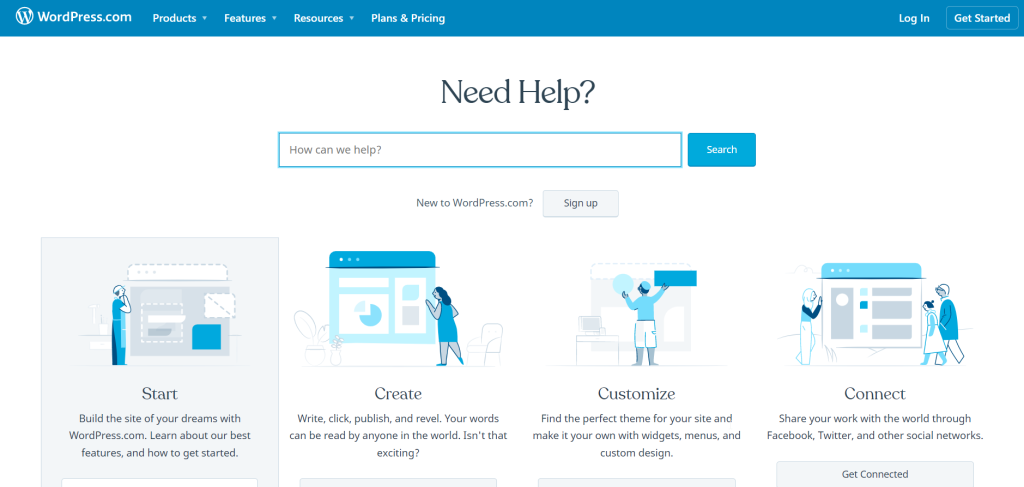
WordPress developers are up on freelancing platforms like Upwork and Fiverr to provide you with the necessary paid support. All you have to do is find the right professional to get your problems fixed.
As a matter of fact, Wpmet, a plugin developer team also has a wealth of WordPress materials in the form of blogs, docs, articles, and social media posts that you can refer.
Joomla
Joomla too has enormous number of active forums with an aim to resolve the issues of its users and developers. One point necessary to mention about Joomla is its copious resources available on its official site.
These resources come in the form of tutorials, guides, videos, articles, etc. and all these are free to utilize. Anyone willing to learn about Joomla can get access to these resources.
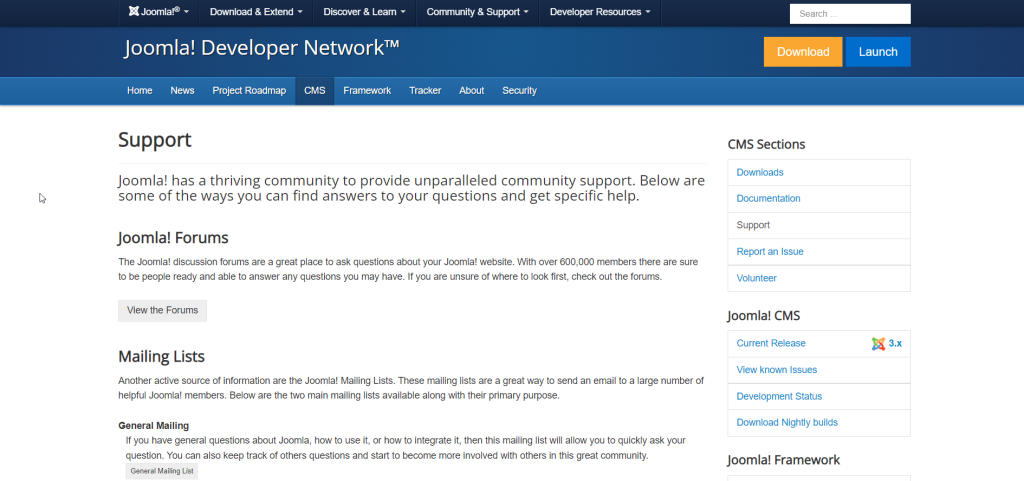
However, hiring a Joomla professional is a bit pricey unlike a WordPress professional. If you want to get a holistic support service from a Joomla expert, you have to buy a support plan. These professionals can offer you expert advice, help you in Joomla development, and do troubleshooting of your Joomla website.
Winner: WordPress
Customization and Design:
As a user, it’s very crucial that you are able to customize your website. And the good thing is that both WordPress and Joomla come with this benefit. Whether you pick WordPress or Joomla, you can extend your website with various plugins and addons. You can also deploy different types of themes in both CMSs to get a catchy look of your website.
WordPress
WordPress has nearly 60,000 free plugins currently in its official directory and that’s plenty, right? Not only that, you can get many other premium plugins in marketplaces like Codecanyon. With these plugins, you can extend your site’s features and make necessary to changes to different elements of your site.
ElementsKit, for example, is a scintillating plugin that can extend the features of Elementor for your WordPress site.
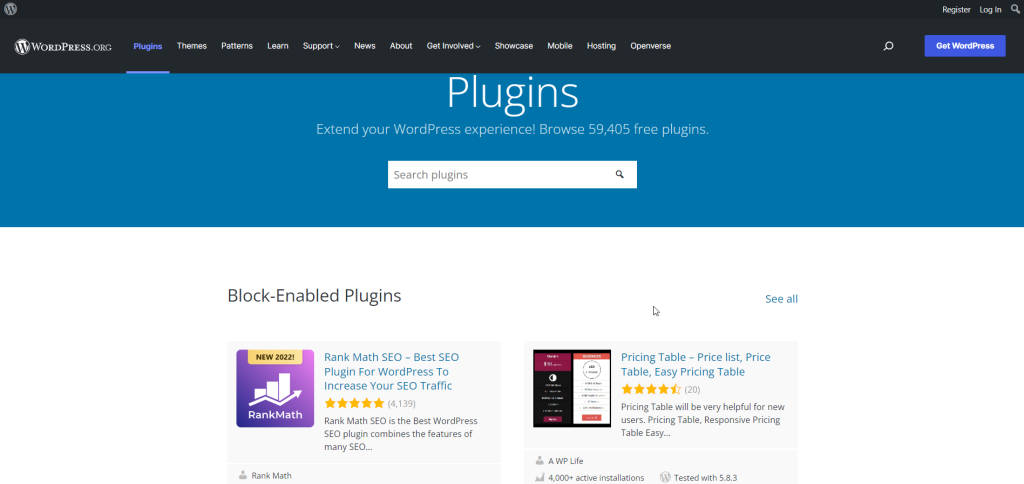
Along with plugins, you will get over 9,000 free themes in WordPress’ official directory to add a charming look to your website. Apart from that, you will get paid themes from third-party developers in marketplaces like Themeforest. All you have to do is pick and choose your preferred theme, free or paid, and install it on your site.
Get to know about the 6 top-notch WordPress image hotspot plugins from the link below if you are eager-
Joomla
When it comes to Joomla, it has almost 6,000 extensions in its official library which is average compared to its counterpart WordPress. But like WordPress, you can get paid plugins for Joomla as well from third-party developers.
However, there is a bit of complexity when it comes to installing a Joomla extension as you can’t access the extension directory right from your admin dashboard. You have to download it from the directory and upload it manually in the installation page.
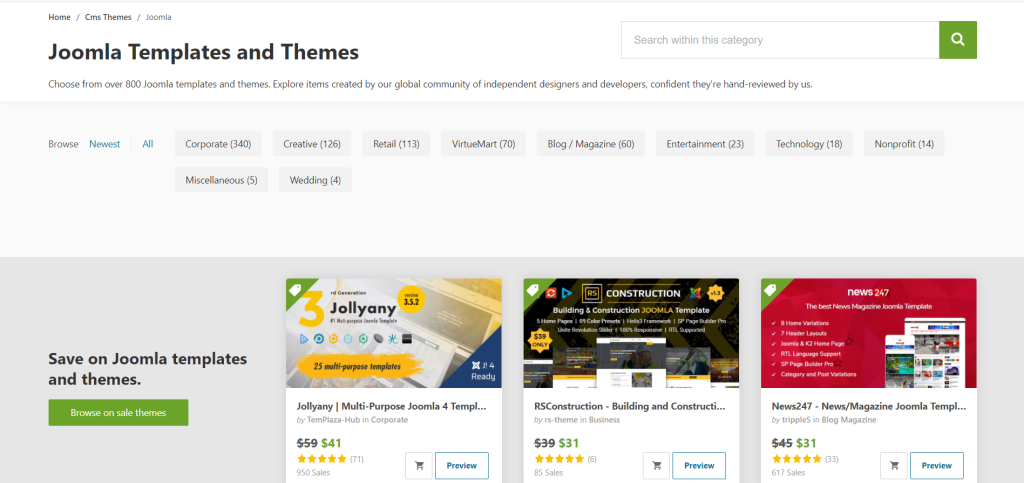
Joomla doesn’t have an official template directory. You have to install Joomla theme from third-party source like Themeforest. However, Joomla has 2 template types- front-end templates and back-end templates.
In order to edit Joomla templates, you have to deploy Joomla Editor. But customization options depend totally on each of the template.
Winner: WordPress
Over to you
I have put forth the side-by-side comparison of both WordPress and Joomla. In my opinion, WordPress outshines Joomla from almost all the perspectives. It’s not just a word of mouth rather the number of stats, features, and other benefits of both the platforms that I presented speak for it.
Between WordPress or Joomla, popularity matters a lot. This is because a product gets traction only if it gets thumbs up from its users. Both WordPress and Joomla are popular, no doubt. But WordPress is way ahead in terms of popularity than Joomla.
And also, don’t forget about the plugins. WordPress has a marvelous list of plugins in its directory outpacing Joomla altogether. ShopEngine is one of the top-rated WooCommerce plugins I can name in particular. Now, it’s up to you to decide whether it’s WordPress or Joomla to build your site!!!
Adding FAQs is key to showcasing a lot of information to your site. Have a quick look at 5 best WordPress FAQ plugins that can ease the process-


